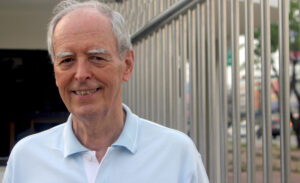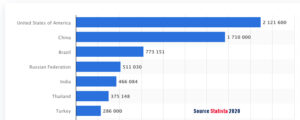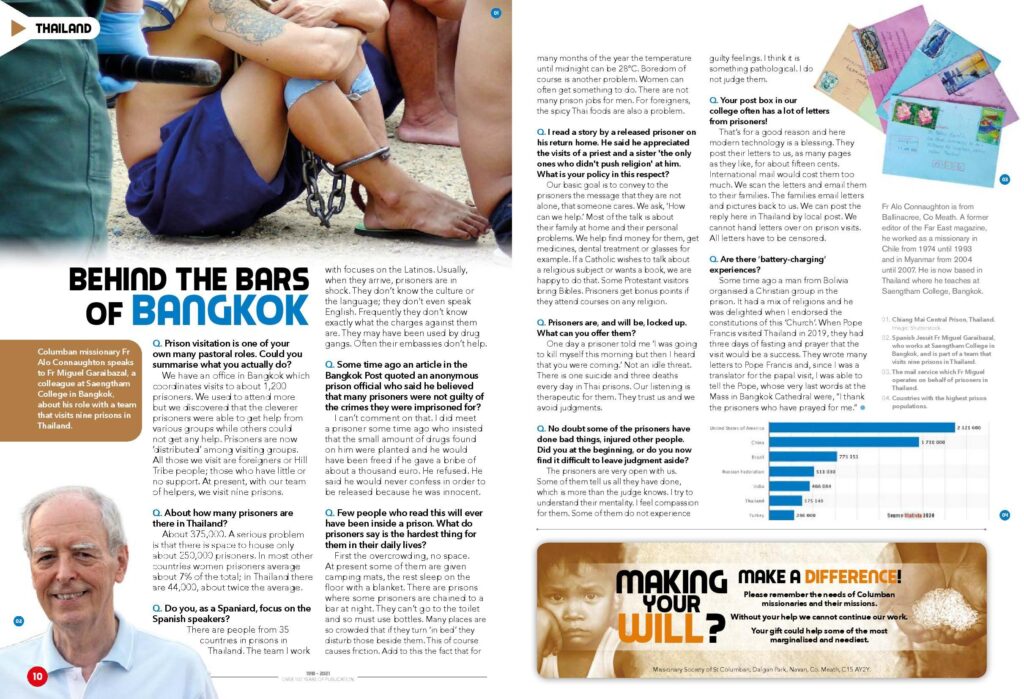Columban missionary Fr Alo Connaughton speaks to Fr Miguel Garaibazal, a colleague at Saengtham College in Bangkok, about his role with a team that visits nine prisons in Thailand.
Prison visitation is one of your own many pastoral roles. Could you summarise what you actually do?
We have an office in Bangkok which coordinates visits to about 1,200 prisoners. We used to attend more but we discovered that the cleverer prisoners were able to get help from various groups while others could not get any help. Prisoners are now ‘distributed’ among visiting groups. All those we visit are foreigners or Hill Tribe people; those who have little or no support. Presently, with our team of helpers, we visit nine prisons.
About how many prisoners are there in Thailand?
About 375,000. A serious problem is that there is space to house only about 250,000 prisoners. In most other countries women prisoners average about 7% of the total; in Thailand there are 44,000, about twice the average.
Do you, as a Spaniard, focus on the Spanish speakers?
There are people from 35 countries in prisons in Thailand. The team I work with focuses on the Latinos. Usually, when they arrive, prisoners are in shock. They don’t know the culture or the language; they don’t even speak English. Frequently they don’t know exactly what the charges against them are. They may have been used by drug gangs. Often their embassies don’t help.

Spanish Jesuit Fr Miguel Garaibazal, who works at Saengtham College in Bangkok, and is part of a team that visits nine prisons in Thailand.
Some time ago an article in the Bangkok Post quoted an anonymous prison official who said he believed that many prisoners were not guilty of the crimes they were imprisoned for?
I can’t comment on that. I did meet a prisoner some time ago who insisted that the small amount of drugs found on him were planted and he would have been freed if he gave a bribe of about a thousand euro. He refused. He said he would never confess in order to be released because he was innocent.
Few people who read this will ever have been inside a prison. What do prisoners say is the hardest thing for them in their daily lives?
First the overcrowding, no space. Presently some of them are given camping mats, the rest sleep on the floor with a blanket. There are prisons when some prisoners are chained to a bar at night. They can’t go to toilet and so must use bottles. Many places are so crowded that if they turn ‘in bed’ they disturb those beside them. This of course causes friction. Add to this the fact that for many months of the year the temperature until midnight can be 28°. Boredom of course is another problem. Women can often get something to do. There are not many prison jobs for men. For foreigners, the spicy Thai foods are also a problem.
I read a story by a released prisoner on his return home. He said he appreciated the visits of a priest and a sister ‘the only ones who didn’t push religion’ at him. What is your policy in this respect?
Our basic goal is to convey to the prisoners the message that they are not alone, that someone cares. We ask, ‘How can we help.’ Most of the talk is about their family at home and their personal problems. We help find money for them, get medicines, dental treatment or glasses for example. If a Catholic wishes to talk about a religious subject or wants a book, we are happy to do that. Some Protestant visitors bring Bibles. Prisoners get bonus points if they attend courses on any religion.

Countries with the highest prison populations.
Prisoners are, and will be, locked up. What can you offer them?
One day a prisoner told me ‘I was going to kill myself this morning but then I heard that you were coming.’ Not an idle threat. There is one suicide and three deaths every day in Thai prisons. Our listening is therapeutic for them. They trust us and we avoid judgments.
No doubt some of the prisoners have done bad things, injured other people. Did you at the beginning, or do you now find it difficult to leave judgment aside?
The prisoners are very open with us. Some of them tell us all they have done, which is more than the judge knows. I try to understand their mentality. I feel compassion for them. Some of them do not experience guilty feelings. I think it is something pathological. I do not judge them.
Your post box in our college often has a lot of letters from prisoners!
That’s for a good reason and here modern technology is a blessing. They post their letters to us, as many pages as they like, for about fifteen cents. International mail would cost them too much. We scan the letters and email them to their families. The families email letters and pictures back to us. We can post the reply here in Thailand by local post. We cannot hand letters over on prison visits. All letters have to be censored.

The mail service which Fr Miguel operates on behalf of prisoners in Thailand.
Are there ‘battery-charging’ experiences?
Some time ago a man from Bolivia organised a Christian group in the prison. It had a mix of religions and he was delighted when I endorsed the constitutions of this ‘Church’. When Pope Francis visited Thailand in 2019, they had three days of fasting and prayer that the visit would be a success. They wrote many letters to Pope Francis and, since I was a translator for the papal visit, I was able to tell the Pope, whose very last words at the Mass in Bangkok Cathedral were, “I thank the prisoners who have prayed for me.”
Fr Alo Connaughton is from Ballinacree, Co Meath. A former editor of the Far East magazine, he worked as a missionary in Chile from 1974 until 1993 and in Myanmar from 2004 until 2007. He is now based in Thailand where he teaches at Saengtham College, Bangkok.
Subscribe to the Far East magazine here: https://columbans.ie/product/far-east-magazine-yearly-subscription/


